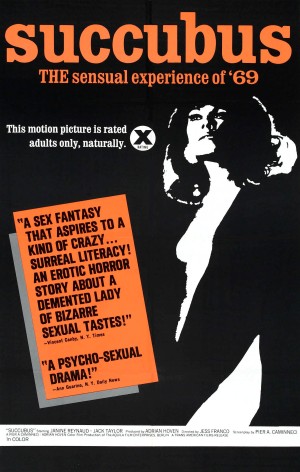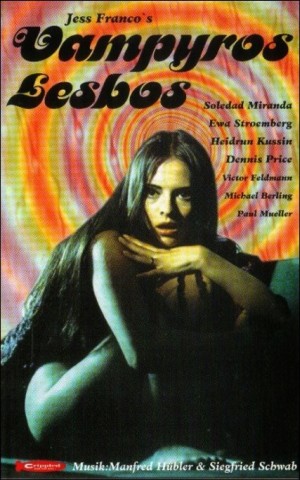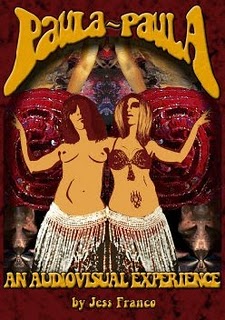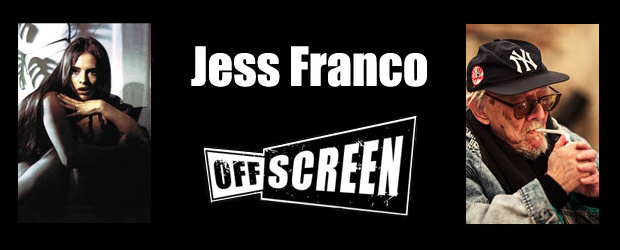Spanish cult filmmaker Jess Franco (1930) was 29 when he made his directorial debut. Since then, he has over 200 features to his name… or to his numerous pseudonyms. His films span a variety of genres, most of which combine horror with a dash of eroticism, while his indomitable urge for total artistic liberty meant that he often had to work with very low budgets. Franco’s inimitable and instantly recognizable style, with his trademark whooshing zooms and pans, is at once surreal, sensual and oddly abstract. The wandering camera draws the spectator straight into a dream world of night clubs, monsters, psychopaths, Sadean violence and pubic hair.
On the first weekend of March in 2010, Jess Franco came to the third edition of the Offscreen Film Festival in Brussels as a special guest and gave personal introductions to some of his movies, all shown on vintage 35mm prints. He came accompanied by his partner and muse Lina Romay, whose talents feature in many of his obsessive-voyeuristic films.
You just finished a new movie called Linda-Linda?
Jess Franco: Linda-Linda?
Lina Romay: No! Paula-Paula! (laughs)
I’m sorry – yes – Paula-Paula – it’s just that there are so many Lindas in your movies!
JF: In my movies are a lot of Lindas – but no Paulas! This is the second, maybe. (laughs)
It’s distributed only on five hundred dvd-copies – it’s a small production.
Yes – it’s a small production because I think at this moment it’s better to make a small production than nothing at all. Nowadays the cinema is cut into pieces. You have enormous films – each shot with two hundred million dollars but without guts or interest inside, just as an exhibition of power. It’s not interesting for me. You know – as a director of second unit I made some films which are in this line but were more interesting than the films they make now.
You worked with Orson Welles on Chimes at Midnight as second-unit director. What sort of scenes did you shoot? Battle scenes?
A lot of battle scenes, but also normal scenes. You know – with Orson it’s very difficult to make a plan. He’d say, “I don’t want you to work with the actors, I prefer to do it by myself” and we’d make total shots of graves and things like that. But immediately after he said that, he would ask you to make a close-up of an actor. (laughs) But it was not difficult and an enormous pleasure to work with him.
But no real planning?
No – never. With him you never knew what you would do in a next shot.
 You’ve mostly worked with very small budgets, but when you collaborated with Harry Towers in the late sixties more money was available.
You’ve mostly worked with very small budgets, but when you collaborated with Harry Towers in the late sixties more money was available.
When I worked with Harry Towers it was different, not only because we had more money but also because they were another kind of productions. They were a kind of B-Hollywood productions, which means another world. Of course I also made smaller films, but the ones that remain – like Necronomicon or films like that – they were independent productions with a medium production value.
Your smaller films have a spontanuous feel to them – they were made quickly. Do you prefer to go quickly from one film to the other or would you prefer to work a longer time on one film?
I prefer to go from one film to another. The style I love is – like Roger Corman – to always be involved in a film. And I discovered that, working on those films with Harry Towers. I think it’s a beautiful way, because I love cinema, and I don’t know of a better thing in the whole world.
Could you always follow the whole of the production? Did you supervise the editing as well?
Listen – of course I prefer to edit. On three or four films in that period I was only supervising the editing – not doing it myself. But later, when I felt a little bit more free, I did the editing myself. Because I think the montage is a part of the life of the film – a very important part. If you let someone else do it, it has to be someone you know very well and take him by the arm so he does the right things. But it’s complicated – always more complicated.
Did many films turn out completely different from how you wanted them to be?
Very rarely. I was always more or less master of my work. Many times I didn’t accept to do a film, because I wasn’t free to do it any way I wanted. I prefer to make a Hammer-film – free – than to make a normal film but not be free, obeying the producers.
Were there periods when you felt less free? When you worked for Erwin Dietrich, were you told what to do?
No – never, never! With Erwin I was as free as I wanted to be. For example – the film they showed last night – Love Letters from a Portuguese Nun. I made the script, I chose the locations and the actors, and then I made the film, and then I edited. The only thing I’m not so happy about is the music. It’s a pity. One of Erwin’s closest friends was a composer, and he insisted he made the music. I was working with him, trying to get him to follow my way. But I was disappointed, because I couldn’t get it.
The main part in that movie is played by Susan Hemingway. There was a bit of a commotion about her age – she was very young at the time?
She was about eightteen. But this was free in Spain, or Portugal. She was a Portuguese girl – very pretty, very nice and nice-looking. Before she played in Portuguese Nun, she played a few small parts with me and she made them in such a sincere way that I asked Erwin to meet her.
There was also a movie by Jorge Grau with you playing a part, miss Romay. A movie with the same story?
LR: Yes – the two films are based on a true story about a nun called Mariana Alcoforada who wrote the letters in the eightteenth century, but my film had nothing to do with Jess’s film. It’s the same story but it has nothing to do with the other film.
JF: The adaptation of Jorge Grau…
LR: It was very intellectual adaptation.
JF: Very serious. Mine was very popular, trying to get the normal audiences – not a special audience of intellectuals saying ‘oh my god’ – but normal people. I don’t like to work for – let’s say – ‘pedants’.
You’ve got a fan base of people who are constantly watching and rewatching your movies nowadays on home video, almost dissecting them. These were movies that were made quickly, just to be seen one time on a fun night out. How do you feel about that?
Yes – quickly, but you know – do you like John Ford’s films? Of course you like them. Do you like Stagecoach? It was made in sixteen days. If a film can be made in sixteen days – why do it in four months? It’s better because in four months you have time to do two more! Film is like making a nice show – it just has to be the best you can do. Not exaggerate, thinking that this is – again – a new masterpiece of the literature or the movies. No, it’s a work. You know – I have at home – It’s a pity my home is quite far and I can’t show you now – a John Ford interview with people of Cahiers du Cinema. They say “Oh, you are a master” and he says “I’m a master?”, “But yes – you’ve made such wonderful films”, “Wonderful films? Which ones?” and they say “My Darling Clementine“, “You think it’s a masterpiece? Okay – thank you very much. I never got the impression this was a masterpiece, but just a film. It’s a matter of opinion. You think it’s a masterpiece, but to me it’s just a film.”
Last year you received the Honorary Goya award for Lifetime Achievement. Why do you think people look differently now on your films than they did before?
I’m a special case in the sense – what happened with my films is that nobody saw them. Nobody knew my films. And suddenly because of the Goya and the homage at the French Cinémathèque, it gave attention to me, to my films. But I don’t care. I feel the same. If they like them – so much the better.
I saw a part of the ceremony on the internet and thought it was very moving and beautiful, everyone standing up and applauding you. You never got that recognition at the time. Did they also talk about you as a rebel against the old regime?
Yes – I wasn’t very friendly with General Franco. The name is the same but we are not relatives – at all! But the award – I think it’s a matter of mode, of fashion. Nowadays they say I’m an interesting director and I’ll be an interesting director for a while. I’m happy about it. When they asked me, “Do you accept to receive the Goya Award” I said, “Of course – you can come here immediately!” (laughs) It was the first time anyone thought of me to get an award. You know – the first film I directed in my life was a short film about a Basque writer called Pío Baroja. For this I got a prize in San Sebastian but I wasn’t there, because I never thought I would get an award. If they had told me “Come here, because tomorrow you will get an award!” I would have taken a train immediately! But it doesn’t mean anything because, as a matter of fact – those people that gave me the first award and other people in general – they didn’t care. They don’t care about you, they don’t care about anything. They care about money, prestige, fame. But nothing else. And in my case – I’m a humble man. I love cinema. It’s the most important thing in my life. My work. But – so what?
 Tomorrow the festival will be showing Vampyros Lesbos, which turned out to be one of your most popular movies. Was it popular at the time or did it grow in popularity?
Tomorrow the festival will be showing Vampyros Lesbos, which turned out to be one of your most popular movies. Was it popular at the time or did it grow in popularity?
I don’t know – I never tried to… When we made the soundtrack, it became popular because people like it. It was popular at the time, but then – because of the release of the records in Germany mainly, the people started to love it. You know – it was on the list of best-selling soundtracks of the year. I did this with a couple of friends – wonderful musicians from Germany called Siegfried Schwab and Manfred Müller – and we didn’t want to do something popular – we wanted to do something well.
They wrote it especially for the movie?
Yes. I think they wanted to do something serious – to make something new in music – a new element. The master of this was Sergio Leone.
You mean combining music with images?
Yes – he made those movie soundtracks before the editing. At the same time he was shooting – he was already using the elements of the music. He did this very well.
Did you do the same with Vampyros Lesbos? Was the music written before the film?
No – it was written after, but immediately after. And we wanted to use the elements of the music because the music that they made was a brand-new style of music.
One of the things that always turn up in your movies are night club scenes – strip shows, song and dance routines in night clubs.
Don’t forget that I come from the music hall. I was a jazz player and composer before all other things in my life. I like jazz music, I like popular music. For me it was normal and not a special effort to introduce those elements in a film. And I like it – it’s ambiance. Not for a commercial reason or anything. I like the nature of the night, of jazz or popular music together. Elements that work very well for cinema. The horror films too. I put a lot of horror-elements in my films, because since I was twelve I liked the Fritz Lang-films and the old expressionists.
You’re planning to do a movie called Vampyria next? And you seek contributors – anyone can participate in the financement?
No – no – I organised a little bit, but really – it’s not well organised yet. I organise it in the same way as people I worked with in the past – like the Roger Corman-people – and an independent producer who I already made a lot of films with called One Shot Productions. They use a system which is very good. They decide with the director and the principal crew which film to do, and then they hold a kind of meeting with possible investors. “Do you want to enter into this production”, “Yes, but I only want to put in three thousand dollars.”, “Okay – you have a participation in the film of three thousand dollars.”
But I read somewhere you can contribute with small amounts – like twenty dollars, fifty dollars.
LR: Yes.
JF: It’s exaggeration. From one or two thousand dollars of participation. Seeing the actual situation of the cinema, and also the general situation – these kind of films became much less expensive because of digital and the new ways to do it. If someone wants to participate with two thousand dollars I say ‘Yes’ and give him all the elements to be paid.
Do you like to work on digital? Would you like to work on film again?
You mean 35mm? If it’s a film I’m interested in – yes. But in my case – I’m not interested in the ‘size’. The problem I think is that 35mm film is dying. Only they try do reserve it by making enormous films. But in general – I don’t think there’s any more money in that. A lot of films are breaking their noses on the enormous budgets, which aren’t useful for anything. The thing we have to do is put more of our souls and our brains into the films, than our money. The problem is not the money. The problem is deeper.
 Can you tell a bit about Paula-Paula? What’s it about?
Can you tell a bit about Paula-Paula? What’s it about?
It’s about – well. One of the things I was fighting all my life – and maybe a lot of people know that, but a lot don’t know – is to make something different than a story of a couple and they get divorced and so on. I never rated stories like that. I think we have to look for new ways of explaining that story. And I made Paula-Paula for this. It’s based on a concert of Friedrich Gulda – one of the greatest composers and piano players – classical piano players – of the century. He was a genius and he’s dead now. He made some records and I had the permission to use two or three of his records for a film. So the story – it’s not really a story. It’s all about the atmosphere. The style of Paula-Paula is born because of this – the records of Friedrich Gulda. I held just two shows of the film with private people. With connaisseurs, but – private people. And they say it’s my best film since thirty years. Which is surprising to me, because I didn’t do anything special. Just feel more free. And that’s all. Because you are never free in this fucking industry. You’re always the slave of the money, the slave of the syndicate, of all the people around, you know? But I decided some years ago to make free films. And until now I am following this feeling and I got a good result.
You never had this feeling you were more or less free before? When you went back to Spain in the beginning of the eighties – didn’t you have a lot of control over your movies?
No – the beginning of the eighties was the moment when the censorship became free in Spain. And I had the chance to do some of those films and now everyone speaks about it. I was quite free but not discovering anything, just following the schools of cinema I knew worked. But I think now – in the four or five of my latest films – I became much more avant-garde. Much more free and not taking note of what they say is nice or what I feel is ‘nice’. What people would say, I don’t care anymore. I don’t care anymore what other people think. I will see – when they watch the films, what they feel – but I try to do them my way. I don’t know if my way is good or bad. But it’s my way. And I think after two hundred films I have the right to show this in a one-hundred percent personal way.
Thank you very much.
Thanks to Jess Franco and Lina Romay for their time, to the organisation of the Offscreen Film Festival 2010 in Brussels for having made this interview possible and to Riny for the pictures.
Visit the Offscreen Festivals website





